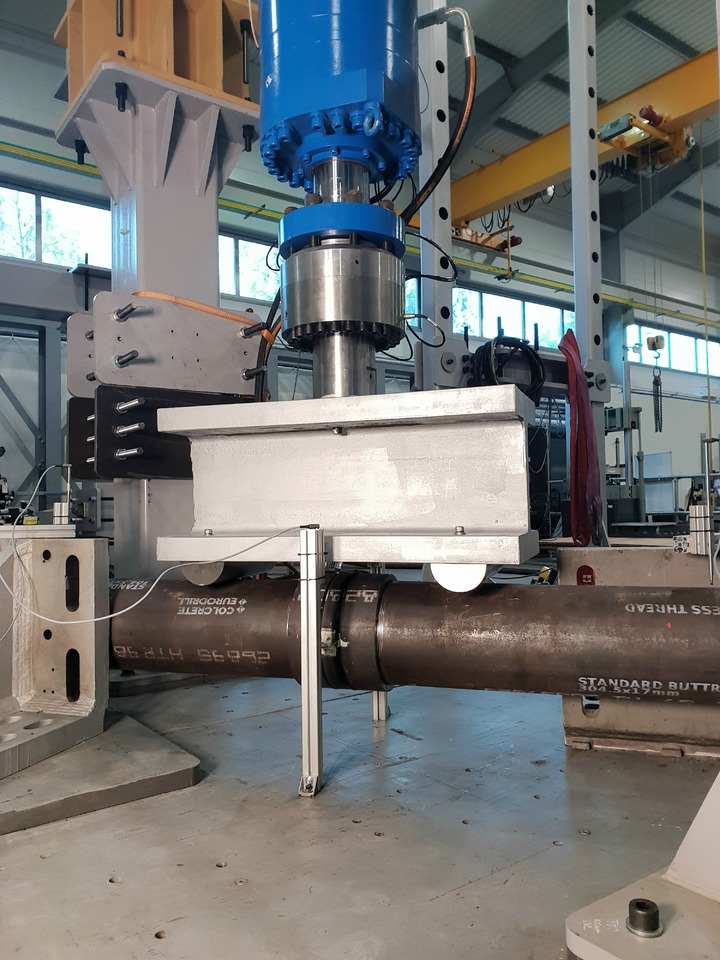Scarborough Spa slope stability scheme put to the test
18 April 2019Crucial strength validation tests – the first of their kind in the UK – have been carried out on reinforcement piles being used in a major engineering project to stabilise cliffs behind the Scarborough Spa complex and protect the site for generations to come.
The University of Sheffield AMRC’s Advanced Structural Testing Centre conducted the tests for piling specialists Keller UK who were appointed to do the work by the civil engineering company overseeing the £13.4m Scarborough Spa Slope Stabilisation Scheme on behalf of Scarborough council.
Andrew Heathcote, technical director at Keller UK, said: “This is the first ever test done in the UK – no-one has produced data from the UK and as far as we’re aware we don’t think it has been done before on this scale. We chose the ASTC because over the years it has tested piles before for a number of industry providers and has a fantastic reputation. We’re very happy with the results.”
Keller is manufacturing 206 concrete-filled steel piles that will be used to reinforce the cliffs behind the seafront heritage buildings to prevent further land movement. The work requires 15m length piles to be driven deep into the ground to stabilise the soil but restricted access means Keller is having to use smaller 7m sections of piles that will have to be connected together to make the longer required length.
To ensure the connected piles are strong enough to withstand soil movement, Keller approached the AMRC’s Advanced Structural Testing Centre to carry out validation tests to determine the displacement on the piles - using forces of up to 150 tonnes.
Andrew said: “Our work is being carried out in the Italian Gardens and the restricted access means we have to take the piles in 7m sections so they are smaller. Because of that we have to connect them together to get the longer lengths and there isn’t a lot of data available on the connectors we are using. A lot of the data available is based on drilled-thread collars from the oil industry and they are not designed for bending but more for torsion.
“We’ve been told we need to do tests to show the connectors we are using have the right bending moment capacity – which is what happens when an external force, or moment, is applied onto the pile causing it to bend – and the connectors are key to that. We need to know they are strong enough.”
A custom rig was designed and built by the ASTC to carry out four-point bending strength tests on four concrete-filled steel piles with varying wall thicknesses and collar lengths, using forces of 1500kN (150 tonnes) to measure deflection in the middle of the tube where the two sections are connected by a threaded collar.
The tubes tested – which weigh a hefty two tonnes each - were: 17mm steel wall with a short collar; 17mm steel wall with a long collar; 22mm steel wall with a short collar; and a 22mm steel wall with a long collar.
The first tube tested was the 17mm wall thickness with a short collar as this was deemed to be the weakest of the four samples. Phil Spiers, head of the ASTC, said the result was ‘very positive’.
“It withstood a load of 1500kN bearing down on it – which is 150 tonnes, the same as two A320 aircraft, 20 elephants or 30,000 house cats – and surpassed Keller’s target for displacement.
“We continued to test the other tubes and they all passed well, giving Keller the validation, and confidence, they need to proceed.
“It is always a pleasure to be involved with validating engineering solutions – the capabilities, capacity, and commitment of the structural testing team at the AMRC were able to realise this test within four weeks of receiving the purchase order - providing a great service to our customers is the most satisfying part of the job. Be assured that no cats were harmed in the course of the testing.”
The first Keller piles arrived on site in Scarborough at the end of last year and work continues. The overall scheme by is expected to be completed by December 2019.



